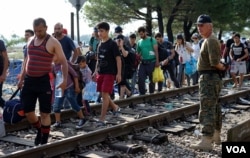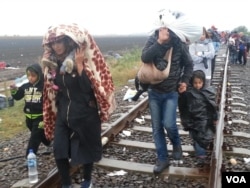A European Union proposal for its 28 member nations to more equitably share the burden of Europe’s escalating migrant crisis is meeting resistance, despite its endorsement Friday by the United Nations.
At a meeting Friday in Prague, the foreign ministers of Hungary, the Czech Republic, Poland and Slovakia refused entreaties by their counterparts from wealthier Germany and Luxembourg to accept mandatory quotas in the EU’s plan for distributing 160,000 migrants among all member countries.
“We need to have control over how many [migrants] we are capable of accepting,” said Czech Foreign Minister Lubomir Zaoralek, host of the gathering.
Germany’s Frank-Walter Steinmeier had urged a unified approach to dealing with Europe’s largest refugee crisis since World War II, possibly "the biggest challenge for the EU in its history," he said.
Steinmeier also called for a "fair distribution mechanism" for dealing with the additional migrants expected to enter Europe. His country receives more asylum requests than any other European nation and anticipates 800,000 migrants to arrive this year.
Denmark declines plan
Denmark also announced Friday that it will not absorb any of the 160,000 asylum seekers. "We have taken our share," Integration Minister Inger Stojberg said.
More than 3,000 migrants arrived in Denmark this week, though most had indicated they were en route to friendlier Sweden.
Britain, too, has declined to accept a quota, saying it will take in 20,000 Syrian refugees over five years.
The dissention prompted the European Council's president, Donald Tusk, to say Friday that he would call a summit of EU leaders this month unless their ministers could agree Monday on how the bloc should cope with the migrant surge.
Meanwhile, the U.N. High Commissioner for Refugees (UNHCR) voiced support for the EU distribution plan but also noted that by year’s end the EU would have to relocate 200,000 refugees from the front-line countries of Greece, Italy and Hungary.
The U.N. called for the immediate establishment of large-scale reception centers in those countries.
The UNHCR also welcomed Washington’s offer to accept 10,000 more refugees and increase its humanitarian assistance to Syrians fleeing violence at home. But it said “the United States could and should do more.”
Refugees crowding Austrian highway
With rail links to Austria’s capital still suspended Friday, thousands of migrants were hiking to Vienna from the border with Hungary in their quest for asylum
Austria's A4 highway was shut to cars Friday, making room for the long lines of refugees trekking toward Vienna to seek asylum in Austria or farther on in Germany. Other weary migrants awaited buses at Nickelsdorf, Austria, just across the border with Hungary.
Hungary has been widely criticized for its treatment of the refugees, compared to the warmer response from Germany and Austria. With its position on the eastern edge of the European Union, Hungary is the first stop for many refugees from war-torn areas seeking a better life in the peaceful, more prosperous nations of Western Europe.
More on U.S. plan
The United States has taken in about 1,500 refugees from Syria since its civil war broke out more than four years ago.
White House spokesman Josh Earnest said the president approved accepting more of the refugees beginning in October.
The White House promised "robust" background checks on the new arrivals to ensure that national security is not endangered. U.S. intelligence chief James Clapper said this week that he feared Islamic State militants might infiltrate the refugees escaping conflict in the Mideast as they head to other countries.
Click here for report from VOA Serbia correspondent Rade Rankovic on the Serbia-Hungary border







